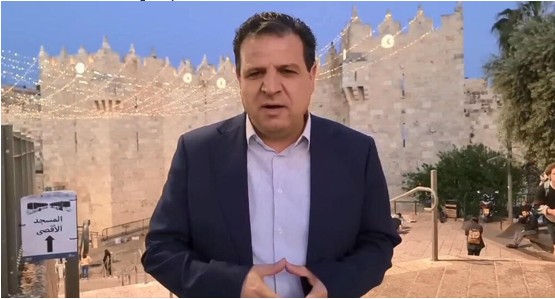Between the Jordan River and the Mediterranean Sea live 14 million people belonging to two categories, Palestinian or Israeli. Most Palestinians and Israelis have no problem with this dichotomous arrangement. A Palestinian living in Ramallah or Gaza City knows he’s Palestinian. A Jew in Tel Aviv or Kiryat Gat knows he’s Israeli. Of these 14 million people, 1.7 million live in between these two groups.

MK Ayman Odeh had received dozens of death threats after visiting Jerusalem’s Old City on Sunday and calling on Arabs serving in Israel’s occupation forces to lay down their arms (Footage: Odeh’s call in last Sunday)
On one hand are us, members of the Palestinian nation born in this country. We dream and pray in Arabic and see ourselves as an inseparable part of our Palestinian nation and the Arab world. On the other hand, we are Arab citizens of Israel, and most of our lives are conducted within the 1967 borders, the Green Line. We go to school here; we may work at Rambam Medical Center and go to university in Jenin. Our children listen to Israeli-Jewish singer Omer Adam and are glued to the screen during the finals of “Arab Idol.”
We didn’t choose this tension. The State of Israel imposed it on us. Since the end of the military administration that was imposed on Arab citizens, we’ve been offered conditional equality, and the condition is an impossible one: alienation from our mother tongue and the effacement of our forefathers’ heritage in exchange for second-class citizenship in a state that views us as a demographic liability.
It’s important that you, readers of Haaretz, understand the ties between members of the Palestinian nation before the walls and fences were erected in an attempt to cut us off from one another. When I look at the picture of Eyad al-Hallaq, an autistic East Jerusalem man shot dead by a Border Policeman, I see my son or my brother. When I see the body of Ghada Sabateen, an unarmed woman shot by soldiers, I can’t help but worry about my mother and her sisters. I’m puzzled by Israelis, who invest so much energy in building ties with Jews around the world, expecting me to support the abuse and oppression of my compatriots in East Jerusalem.
Every Arab citizen of Israel navigates his or her life in the Jewish state with courage. Laborers, students, physicians, firemen and journalists, we all walk a fine line. There are days in which tension rises, with its concomitant anger and frustration, along with other days filled with pride and hope that we might construct a different reality. So, if there are contradictions between the demands of Arab citizens that the police commissioner vanquish crime organizations and our fury at the presence and violence of Border Policemen at Damascus Gate and in Sheikh Jarrah, these contradictions do not stem from our identity crisis, but from the identity crisis of a state that views itself as Jewish and democratic, conquering and liberal.
We are not responsible for resolving these contradictions, just as we are not responsible for the inevitable breaking apart of the governing coalition. What did you expect? After the ceremonies and celebrations, tough decisions need to be made. The fact that center-left coalition members groveled to placate Interior Minister Ayelet Shaked is their responsibility. Getting all worked up about the Joint List cannot hide the fact that they sold their principles cheaply; that the government prefers to hook the “hilltop youth” to the national electricity grid instead of doing so for the hundreds of thousands of people living in unrecognized villages in the Negev; that the coalition mobilized to pass a cruel citizenship law, unwilling to rescind the nation-state law and the Kaminitz law, which stiffens punishment for illegal construction, mainly in Arab communities.
The crumbling of the “Anyone but Bibi” coalition shows that there is no future for politics based on an external threat and on fear of an unknown future. We seek a political partnership that will bring about peace and equality, but we won’t give up our identity because of Netanyahu’s threatened comeback. Seeking the least bad solution is a poor man’s way out; it never leads to true change. Between the Jordan and the Mediterranean live 14 million people. If you see us as extremists, it’s because you are blind to the existence of half of them.
Op-ed published by the Joint List chair, MK Ayman Odeh (Hadash), in Haaretz, April 15, 2022


